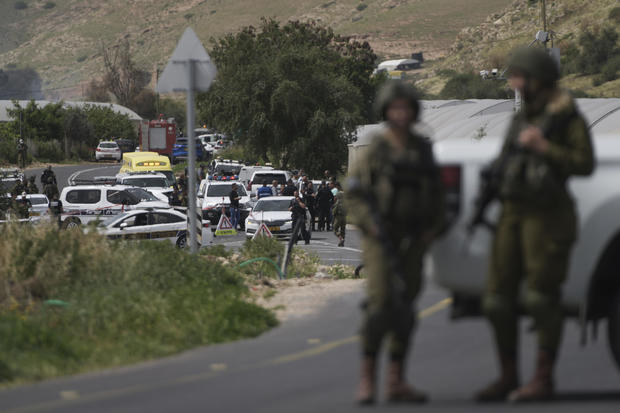Jerusalem — Israeli officials said two women were killed in a suspected terror attack near a West Bank Israeli settlement Friday as it launched rare strikes in southern Lebanon and continued bombing targets in the Gaza Strip, marking a further escalation in the region following violence this week at Jerusalem’s most sensitive holy site. Friday’s strikes in southern Lebanon came a day after militants fired nearly three dozen rockets from there at Israel, wounding two people and causing some property damage. The Israeli military said it targeted installations of Hamas, the Palestinian militant group, in southern Lebanon and Gaza.
With tension mounting, Israeli officials reported the shooting terror attack near the Israeli settlement of Hamra, in the occupied West Bank, saying two sisters in their 20s were killed and their mother was left fighting for her life. Israel’s military said “a shooting attack was carried out on a vehicle” and troops were searching the area for suspects.
Roads in and out of the area were closed by Israeli forces amid the search.
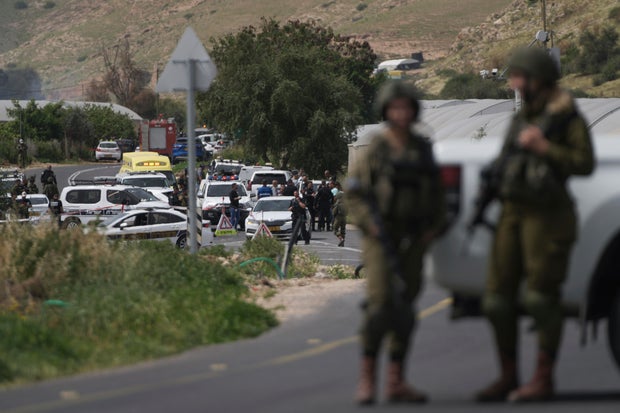
Nasser Nasser/AP
A statement from Prime Minister Benjamin Netanyahu’s office said he was being updated regularly on the attack and would convene his senior security officials to assess the unfolding events. After that meeting, the military said Defense Minister Yoav Gallant had “instructed the defense establishment to direct all the necessary resources to apprehending the terrorists and to reinforcing security on all the key routes and communities in Judea and Samaria and across Israel.”
The exchange of rocket and missile fire and the latest apparent attack on Israeli civilians came at a time of heightened religious fervor, as Jews celebrate Passover, Muslims are in the middle of the holy month of Ramadan and Christians begin Easter weekend. In 2021, an escalation also triggered by clashes at Jerusalem’s Al-Aqsa Mosque compound spilled over into an 11-day war between Israel and Gaza’s Hamas rulers.
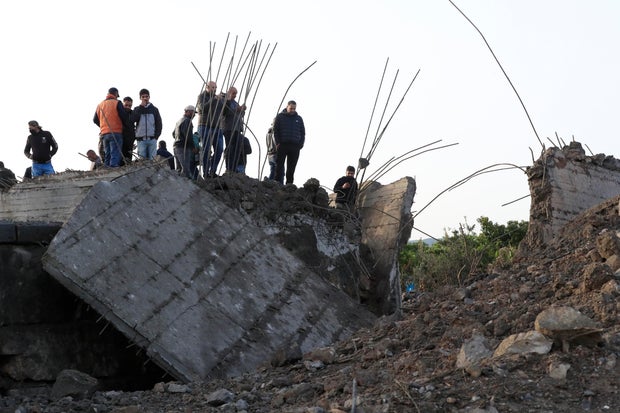
Mohammad Zaatari/AP
Associated Press correspondents in the area said several missiles fired by Israeli warplanes struck an open field in the town of Qalili near the Palestinian refugee camp of Rashidiyeh, close to Lebanon’s coastal southern city of Tyre, while others struck a bridge and power transformer in the nearby town of Maaliya and a farm on the outskirts of Rashidiyeh, killing several sheep. No human deaths were reported.
Israeli strikes in Lebanon risk drawing Lebanon’s Hezbollah militia into the fighting, which could lead to war. The Iran-backed group, armed with thousands of rockets and missiles, holds sway over much of southern Lebanon and is viewed by Israel as a bitter foe.
The Israeli military was careful to note in its announcement about Friday’s attack that it was targeting only sites linked to Palestinian militants. In recent years, Hezbollah has stayed out of other flareups related to the Al-Aqsa Mosque, which stands on a hilltop revered by Muslims and Jews.
Hamas issued a statement condemning the Israeli strikes, while Israel’s military said it had struck targets belonging to the militant group in southern Lebanon and the Gaza Strip in response to the rocket attacks.
“The (Israel Defense Forces) will not allow the Hamas terrorist organization to operate from within Lebanon and holds the state of Lebanon responsible for every directed fire emanating from its territory,” it said in a statement.
In Washington, principal deputy State Department spokesman Vedant Patel said Israel had “legitimate security concerns” and “every right to defend themselves,” but he also urged calm, saying “any unilateral action that jeopardizes the status quo [around the al Aqsa Mosque] to us is unacceptable.”
British Foreign Secretary James Cleverly appealed Friday for “all parties across the region to de-escalate tensions.” He condemned the rocket attacks on Israel from Gaza and Lebanon, and also criticized Israeli police for “violence” inside the Al-Aqsa mosque.
In a tweet early Friday morning, Lebanon’s national army said it had discovered a rocket launcher with unfired missiles in the south of the country, only about five miles from the border with northern Israel, and that work was underway to dismantle the device.
The head of the U.N. peacekeeping force in Lebanon, Maj. Gen. Aroldo Lázaro, said he was in contact with Israeli and Lebanese authorities early Friday. The force, known as UNIFIL, said that both sides had said they do not want war.
In Jerusalem, before dawn prayers on Friday, violence erupted again at the hilltop compound as Israeli police stationed at one of the gates forcibly dispersed vast crowds of worshippers who chanted praise for Hamas while pushing their way into the limestone courtyard. Videos from the scene showed police beating large groups of Palestinian men with sticks until they stumbled backward, falling and knocking down vendors’ tables.
Meanwhile, Israeli airstrikes on Gaza resumed early Friday, after militants fired more rockets from the blockaded territory, setting off air raid sirens in the Israeli coastal city of Ashkelon. The military said targets included the entry shaft to an underground network used for weapons manufacturing.
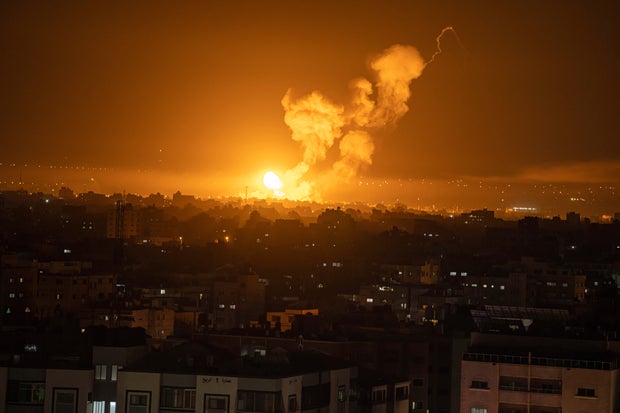
Fatima Shbair/AP
The current round of violence began Wednesday after Israeli police twice raided the Al-Aqsa Mosque in Jerusalem’s Old City. That led Thursday to rocket fire from Gaza and, in a significant escalation, the rocket barrage from Lebanon.
Israeli Prime Minister Benjamin Netanyahu convened his Security Cabinet for a three-hour meeting late Thursday. “Israel’s response, tonight and beyond, will extract a heavy price from our enemies,” he said in a statement after the meeting.
Almost immediately, Palestinian militants in Gaza began firing rockets into southern Israel, setting off air raid sirens across the region. Loud explosions could be heard in Gaza from the Israeli strikes, as outgoing rockets whooshed into the skies toward Israel. For now, Palestinian militants have fired only short-range rockets from Gaza, rather than the long-range projectiles that can reach as far as Tel Aviv and typically invite harsher Israeli retaliation.
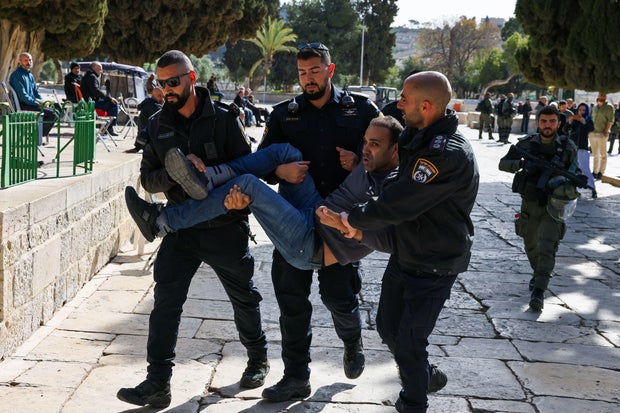
AHMAD GHARABLI/AFP/Getty
The Israeli military said the rocket fire on its northern and southern fronts was carried out by Palestinian militants in connection to this week’s violence at Al-Aqsa where Israeli police stormed into the building with tear gas and stun grenades to confront Palestinians barricaded inside on two straight days. The violent scenes from the mosque ratcheted up tensions across the region.
In a briefing with reporters, Lt. Col. Richard Hecht, an Israeli military spokesman, said the army drew a clear connection between the Lebanese rocket fire and the recent unrest in Jerusalem.
“It’s a Palestinian-oriented event,” he said, adding that either the Hamas or Islamic Jihad militant groups, which are based in Gaza but also operate in Lebanon, could be involved. But he said the army believed that Hezbollah and the Lebanese government were aware of what happened and also held responsibility.
The mosque — the third-holiest site in Islam — stands on a hilltop revered by Jews as the Temple Mount, the holiest site in Judaism. The competing claims to the site have repeatedly spilled over into violence over the years.
No faction in Lebanon claimed responsibility for the salvo of rockets. A Lebanese security official, who spoke on the condition of anonymity because he was not authorized to speak to media, said the country’s security forces believed the rockets were launched by a Lebanon-based Palestinian militant group, not by Hezbollah.
Lebanon’s caretaker prime minister, Najib Mikati, condemned the firing of rockets from Lebanon, adding that Lebanese troops and U.N. peacekeepers were investigating and trying to find the perpetrators. Mikati said his government “categorically rejects any military escalation” and the use of Lebanese territories to stage acts that threaten stability.
Hezbollah has condemned the Israeli police raids in Jerusalem. Both Israel and Hezbollah have avoided an all-out conflict since a 34-day war in 2006 ended in a draw.
- What’s behind the escalating violence and protests in Israel?
The current escalation comes against the backdrop of Netanyahu’s domestic problems. For the past three months, hundreds of thousands of Israelis have been demonstrating against his plans to overhaul the country’s judicial system, claiming it will lead the country toward authoritarianism.
Key military units, including fighter pilots, have threatened to stop reporting for duty if the overhaul is passed, drawing a warning from Defense Minister Yoav Gallant that Israel’s national security could be harmed by the divisive plan. Netanyahu said he was firing Gallant, but then backtracked as he put the overhaul on hold for several weeks. Critics could also accuse him of trying to use the crisis to divert attention from his domestic woes.
Netanyahu said that the domestic divisions had no impact on national security and that the country would remain united in the face of external threats.
